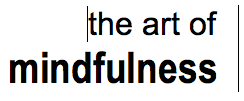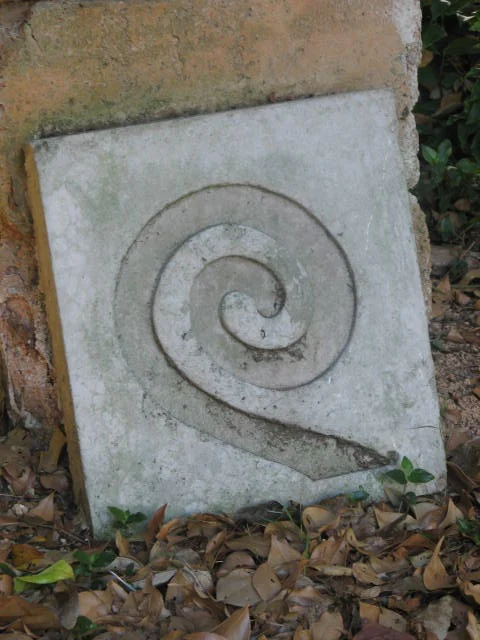Mindfulness Practice and Spiritual Practice – what’s the difference?
/After the first Introduction to Mindfulness class a few weeks ago, a participant came up to me and asked: “If it’s true I’m not my thoughts, or the person my thoughts suggest me to be, then who am I?” There was a kind of poignancy in someone asking such a timeless and existential question so innocently. At the second class, she said she’d consulted Google during the week, but still wasn’t any the wiser. The group laughed. She did too.
I thought her question was a great lead-in to a reflection about the difference between spiritual practice and mindfulness practice.
In mindfulness practise, as you know, we intentionally focus attention on the present moment, often using one of the sense perceptions (feelings in the body, sounds, the sensation of the breath…) Sometimes we go a bit deeper and witness thoughts and feelings as they arise, as these too are happening in the now. You could say we are exploring the surface of now from the point of view of the individual. When we do this, there are various benefits to the mind, body and nervous system. This is mindfulness practice, a tool for wellbeing, something sensible to do like eating good food and exercising. And, even at this level, we begin to intuit that the one observing can’t possibly be the thoughts or the feelings, because these objects of awareness are always changing, and “I” am aware of them.
At some point, a deeper layer may draw you, the witness, to become aware of Yourself, not as the separate one observing, but rather as the perceiving consciousness itself, the space in which the perception happens. Awareness itself. Here the personal “I” is dissolved into the unchanging “I” and a deeper dimension arises, which is the spiritual dimension. A human being in this state has surrendered, to one degree or another, the illusory separate self. Authentic spiritual practice is the practice of awakening to, remembering and cultivating the relationship with the timeless Self (or Spirit, or Life Force, or God, or, as Ekhart Tolle calls it, Presence). There is the realisation that “I”, in Truth, am unchanging awareness. This is my True Self.
Everything in my culture and upbringing, of course, encourages me to believe that I am the limited small self “I”, not the awareness in which that one resides, and to base my feelings and reactions on the experiences of that “I.” Here’s an example to illustrate what I mean. I've been to the lovely Te Moata Retreat Centre in the Coromandel many times over the last 18 years, in varying roles.The first time I went as a retreat participant. Often after that I attended as the meditation teacher's partner. At a later stage I started offering retreats there myself, and went to the centre in the capacity of “mindfulness teacher.” Then, at another point, I went along to be part of the service team for a retreat, at a time of intense mental and emotional stress.
The separate “I” felt vastly different according to the story of why I was there. Teacher – great; I’m given a lovely hut in the bush to stay and I’m treated as fairly special. Teacher’s partner – also positive and affirming; there’s a certain status here, which feels good. Retreat participant – fine, kind of neutral; up and down depending on my mood and how the meditations go; seeking a peaceful state. On the service team, stressed – could barely function, felt shamed and a mess, and at odds with who I like to think I am. In terms of a spiritual understanding, “I”, the real Self, awareness itself, remained unchanged in all these differing situations. That Self witnesses the so-called “good” and “bad” with equanimity, knowing it to be a changing and temporary play, with the small “I” being the player engaging in it.
The separate self, the one who is convinced it is apart, resides in fear. It has to protect and construct itself, using roles, manipulating conditions and espousing strong and righteous “me” points of view to keep it in place. This is the ego mind, the seeking mind, the restless one convinced that “things will be better when……” It is full of wants, including so-called “spiritual” wants (I want freedom, I want enlightenment, I want to be more generous, I want to live like she does because she’s so inspiring ….”) The ego-mind is convinced that transformation can happen through behaviour and that happiness is to be found outside myself
Mindfulness practice grew out of traditions in which meditation was used to develop the concentration of the mind so that practitioners could sustain the discipline needed to contemplate spiritual truths. These days, people aim use its benefits in a purely “secular” way. There are a few implications of that. Here’s one example.
On April 7th, in the Wellington Dom Post there was an article called "NZ Soldiers enter into a mind-field." The article was about the way the NZ Defence Force is using mindfulness in military training. Here's part of it:
It is but one tool of many taught to improve how soldiers, sailors and airmen cope with the challenges and stresses of military life and operations …. This secular application of mindfulness in a conflict zone, to keep military personnel focused, seems at odds with its pacifist Buddhist roots.
A monk at the Bodhinyanarama Monastery, … said some people might have concerns about this use of mindfulness, but he did not.
“One of the aspects of the mindfulness movement is that the military uses it: how to more mindfully kill your enemy, without suffering guilt and recriminations.
"Surely it's going to be a better thing to have happier, healthier soldiers. That they can be more focused and concentrated when they pull the trigger,’ he said.
I'm still puzzling as to whether the monk quoted was taking the piss or not!

